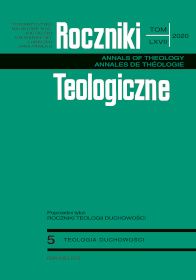Moral Renewal as a Socio-Religious Imperative and the Destructive Actions of an Oppressive Totalitarian State: in the Context of Cardinal Stefan Wyszyński’s Personalistic Concept of Social Life
Moral Renewal as a Socio-Religious Imperative and the Destructive Actions of an Oppressive Totalitarian State: in the Context of Cardinal Stefan Wyszyński’s Personalistic Concept of Social Life
Author(s): Ryszard FicekSubject(s): Christian Theology and Religion, Theology and Religion, Systematic Theology
Published by: Towarzystwo Naukowe KUL & Katolicki Uniwersytet Lubelski Jana Pawła II
Keywords: Cardinal Stefan Wyszyński; totalitarian ideology; communism; personalism; secularization; atheization; moral renewal
Summary/Abstract: The historical legacy and destructive actions of the oppressive totalitarian state of the post-war Polish Peoples’ Republic were associated with severe threats to the Nation’s socio-cultural existence. In this context, the seriousness of the situation was related to both geopolitical conditions and several systemic shortcomings of the communist state, ideologically hostile to Christianity, as well as to native culture. However, dangerous addictions and national moral flaws also played an important role. Therefore, the specificity of the situation demanded an absolute opposition to the above problems on the part of all social structures of the Nation. According to Cardinal Wyszyński, it was not only about overcoming one or another national-moral defect, but a comprehensive moral transformation in the spirit of Christian culture was required, which could become a religious and social program for the moral rebirth of the entire Nation.Thus, moral renewal has become an indispensable condition for positive changes in Poland. It is realized in the community of the Church by proclaiming the Gospel message of redemption accomplished in Jesus Christ and calling for fidelity to the baptismal sacramental grace. At the same time, it displayed the ways and means of renewing all socio-cultural structures in their specific historical reality. Unfortunately, the programmatic process of secularization and atheization carried by employing various means and methods posed a significant threat to Poles’ culture and identity and the Nation’s religious and moral life.Therefore, the foundation for social life’s moral renewal was a rebirth in Christ, realized through metanoia and reconciliation with God in the Church. However, this process requires a radical turn towards God, which results in a change of consciences and a deepening of the human person’s consciousness and moral sensitivity, family, and, consequently, the nation. Nevertheless, a change in thinking and evaluating of conscience entails a shift in attitudes that, oriented towards holiness, would lead to Christian perfection in Christ. Thus, the return to God through Marian devotion (Soli Deo per Mariam) becomes the fundamental basis of the moral renewal of social life’s whole reality. It takes place both through a continuous transformation of hearts and attitudes of individual people as well as the entire community in the dimension of sacramental reconciliation with God in the Church.
Journal: Roczniki Teologiczne
- Issue Year: 67/2020
- Issue No: 5
- Page Range: 39-61
- Page Count: 23
- Language: English

